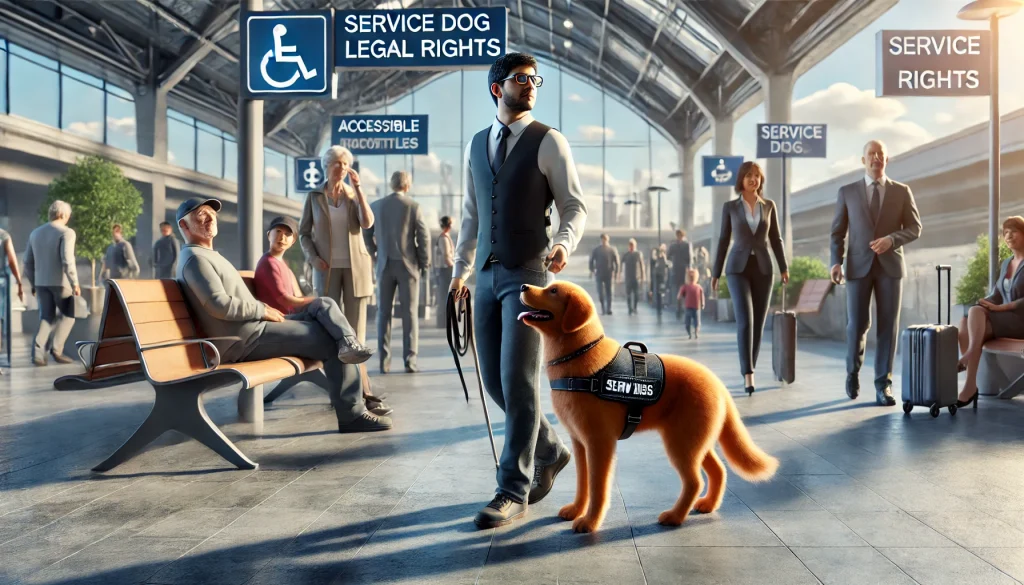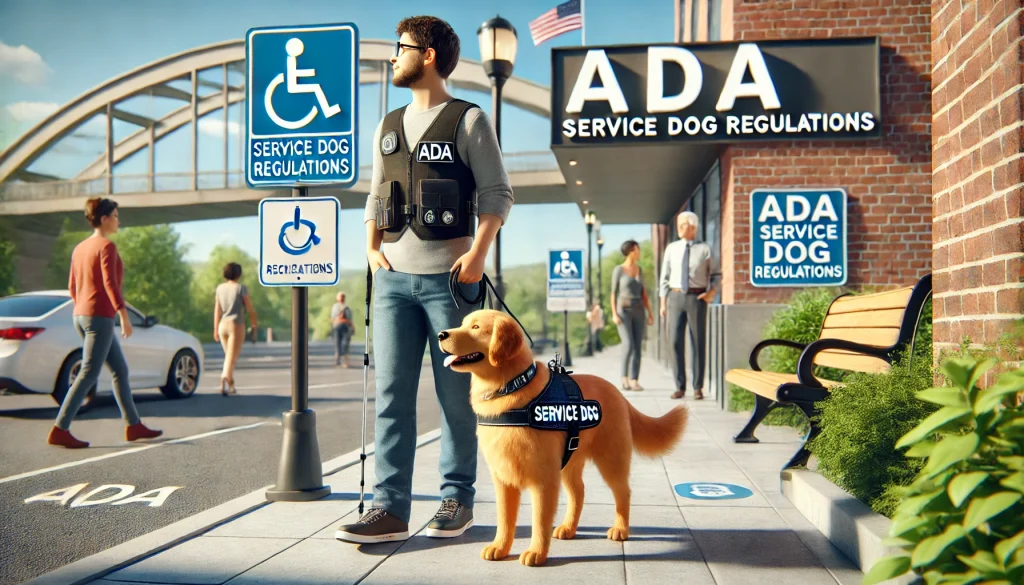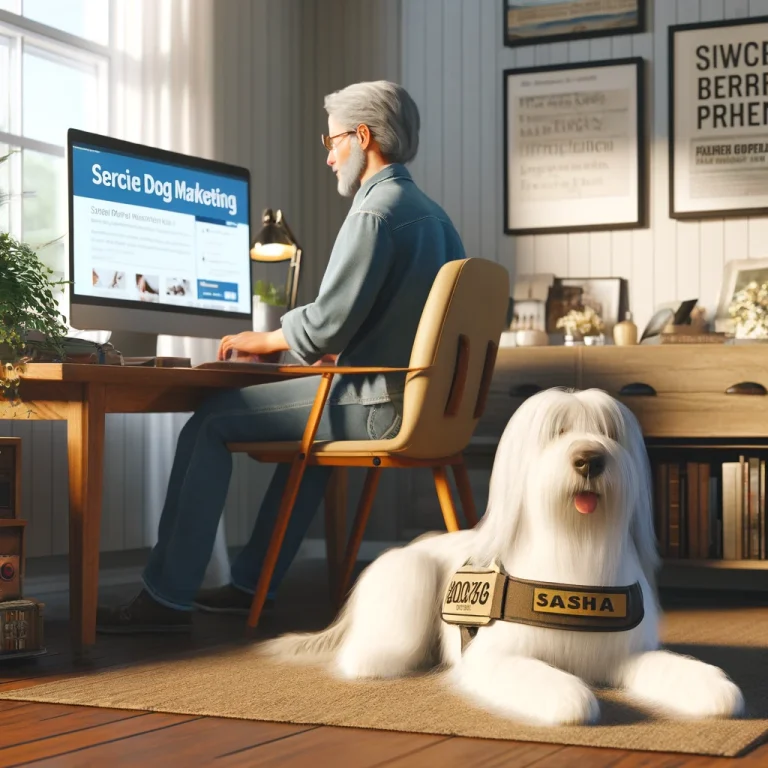Service dogs play a crucial role in the lives of individuals with disabilities. Ensuring that these animals and their handlers are protected under the law is essential. In this blog post, we will delve into the legal protection for service dogs, focusing on service dog legal rights, service dog protection laws, and ADA service dog regulations. By the end of this guide, you will have a comprehensive understanding of the rights and protections available to you and your service dog.

Understanding Service Dog Legal Rights
What Are Service Dog Legal Rights?
Service dog legal rights are the protections and privileges granted to service dogs and their handlers under various laws. These rights ensure that individuals with disabilities can live and work independently with the help of their service dogs. The legal framework protects against discrimination and ensures access to public spaces, housing, and transportation.
Importance of Knowing Your Rights
Knowing your service dog legal rights is crucial. It empowers you to advocate for yourself and your service dog, ensuring that you can navigate public and private spaces without undue barriers. Understanding these rights also helps in addressing any challenges or violations that may arise.
Service Dog Protection Laws
Americans with Disabilities Act (ADA)
The ADA is a key piece of legislation that protects the rights of individuals with disabilities, including those who use service dogs. Under the ADA, service dogs are allowed to accompany their handlers in all areas where the public is permitted. This includes restaurants, hotels, schools, and public transportation. The ADA defines a service dog as one that is trained to perform tasks directly related to the handler’s disability.
Fair Housing Act (FHA)
The FHA provides additional protections for service dogs in housing situations. Landlords and housing providers must make reasonable accommodations for individuals with service dogs, even if the property has a “no pets” policy. This ensures that individuals with disabilities can live independently without facing housing discrimination.
Air Carrier Access Act (ACAA)
The ACAA allows service dogs to accompany their handlers in the cabin of an aircraft. Airlines must accommodate service dogs without charging extra fees. However, they may require documentation to confirm that the dog is a service animal and not a pet.
State and Local Laws
Many states and localities have additional laws protecting the rights of service dogs and their handlers. These laws can provide further protections and should be reviewed to understand the full extent of your rights. For instance, some states have specific provisions regarding service dog identification and access rights.

ADA Service Dog Regulations
Definition of a Service Dog
Under ADA regulations, a service dog is defined as a dog that is individually trained to do work or perform tasks for a person with a disability. This can include guiding individuals who are blind, alerting individuals who are deaf, pulling a wheelchair, alerting and protecting a person having a seizure, or performing other specific tasks.
Tasks vs. Emotional Support
It is important to distinguish between service dogs and emotional support animals. While service dogs are trained to perform specific tasks, emotional support animals provide comfort by being present. Emotional support animals do not have the same legal protections as service dogs under the ADA.
Rights of Access
Service dogs are allowed access to public spaces, including businesses, government buildings, and nonprofit organizations. Businesses cannot require documentation or proof of the dog’s status as a service animal. They may only ask two questions: if the dog is a service animal required because of a disability and what work or task the dog has been trained to perform.
Challenges and Solutions
Addressing Discrimination
Despite the legal protections, service dog handlers may still face discrimination. If denied access or accommodations, it is essential to remain calm and educate the individual or entity about your legal rights. Providing information about the ADA and local laws can often resolve misunderstandings.
Documentation and Identification
While not required by the ADA, having documentation or identification for your service dog can be helpful. This can include a letter from a healthcare provider or a service dog vest. These items can help in situations where your rights are questioned.
Self-Training Options
Training your own service dog can be a rewarding experience. Self-training allows you to tailor the training to your specific needs. Resources and guides are available through websites like ServiceDogOwners.com, providing step-by-step instructions and support from experienced trainers.
Importance of Pet Insurance and Service Dog Products
Ensuring Health and Well-being
Pet insurance is crucial for maintaining your service dog’s health. It covers veterinary expenses, ensuring your dog receives regular check-ups, vaccinations, and emergency care. A healthy dog is more capable of effective training and service. Regular veterinary care can detect health issues early, preventing them from becoming severe.
Investing in Quality Products
Using high-quality service dog products, such as vests, harnesses, and leashes, enhances your dog’s ability to assist you. These products ensure comfort and visibility, making it easier for your service dog to perform their tasks. High-quality gear reduces the risk of injury and improves your dog’s performance.
Conclusion
Understanding the legal protections for service dogs is essential for ensuring their effectiveness and your peace of mind. Knowing your service dog legal rights, being aware of service dog protection laws, and familiarizing yourself with ADA service dog regulations are crucial steps. By staying informed and proactive, you can ensure that your service dog is able to assist you without undue barriers.
Remember to invest in pet insurance and quality service dog products to maintain your service dog’s health and effectiveness. Whether you choose professional training or self-training, these dogs become invaluable partners in managing disabilities and improving quality of life.
Stay informed, stay protected, and continue to build a strong bond with your service dog. Understanding and advocating for your rights will help you and your service dog navigate the world with confidence and ease.
Searching for a way to boost your income while keeping your service dog by your side? Learn how to launch a Side Hustle or new career and increase your earnings alongside your loyal companion. Click Here to find out more and start your journey today!





